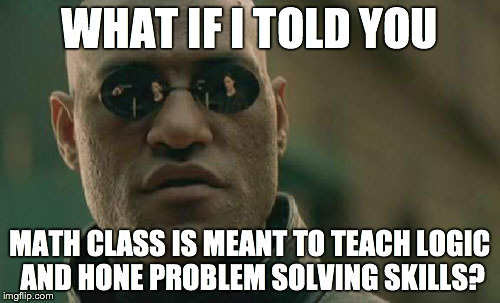 |
| memecenter.com |
As a teenager, I hated it.
As an adult, I now see math's purpose, but still am utterly frustrated by it.
This is not the story that I want my students to be telling when they become adults.
So, a little bit about myself: I've always been a creative person. As a child I took an interest in stories, art, music, and history, and in high school, I developed interests in philosophy and psychology. I went to university for English literature. One of my life goals is to publish a fantasy novel, and my other hobbies include drawing, attempting to play guitar and flute, hiking, and writing poetry. I've always lived in the realm of the theoretical and the imaginative, where the focus was on creativity and beauty. Math never fit into this world of mine. Our relationship began as a tolerable dissonance that was easily forgotten while I learned basic concepts in elementary school, but developed into a seething hatred in high school when math homework required more time and effort, forcing its way into my evenings and interrupting my life. I deliberately went behind my guidance councilor's back to drop out of the grade 12 math course when I learned that I wasn't required by law to take it.
 |
| pinterest.com |
The second story took place when I told one of my friend's mom about my teacher quoting our textbook word problem word for word, commenting that nobody I knew had ever used the math they had learned in high school when they became adults. "Well," she replied, "my husband actually used had to use some math that he learned in high school for his job the other week. I walked in on him Googling something about the quadratic formula." This was the moment that I realized just how pointless math class was, because even if I did understand a concept now, when I would actually run into a situation in my adult life where I would need to use it, I would be sure to have completely forgotten how to do it and would be resorting to relearning it through Google.
So, math class in school is completely pointless, right?
 |
| imgflip.com |
This TED talk discusses the issue of how math has been taught in our schools, and how this style of teaching has completely affected students. Dan Meyer is a high school math teacher who is focusing on teaching his students to learn the logic behind math rather than having them memorize formulas, and connecting everything that they learn about to real life situations. His students are more engaged, have a deeper understanding, and retain the information for much longer. This is the same kind of teacher that I want to be.
I've begun to change my perspective about math already, but I still have a long road ahead of me, and many layers of bias against math to rebuild.
Beautifully written Nicole. It is very evident that you majored in English, simply through the way you expressed your thoughts so eloquently. In this post, you shared with us very personal experiences that you've had, that have greatly impacted your attitude toward mathematics. Both stories brought to light the common issue that many students about mathematics, which is constantly questioning the relevance of what we they are learning in school. Asking adults, "will I ever use this again?" Now, as teacher candidates, we are challenged to recall stories such as these and think of them from a teacher's perspective. How would you have sold parabolas to your grade 10 class? Would you have been able to make a direct connection to how it can be used in their daily lives? Mathematics as we have learned, is so much more than simply knowing the content but its about applying mathematical skills in the outside world and in other subject areas. I really enjoyed the part in your post where you recognized the importance of students gaining problem solving skills and logical reasoning skills through learning mathematics. These are two of the many skills that we can gain from the subject that we can easily apply elsewhere.
ReplyDeleteGreat work!